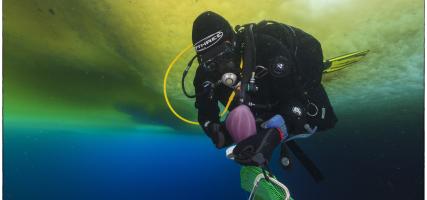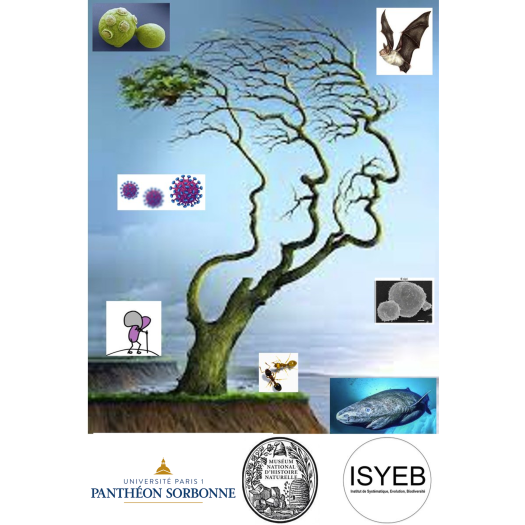
Please find below an advertising and invitation to attend the 2nd edition of the colloquium “Expanding evolutionary theories of ageing to take into account symbioses and interactions throughout the Web of Life”.
Feel very free to advertise by forwarding to anyone you may think would be interested.
Registration closes on 13 october
The event is free, hybrid (attendees can join either in person or virtually) but upon registration by email before October 13th to : epbapteste@gmail.com . When emailing, please let me know whether you would prefer to attend virtually or in person (40 seats, on a first serve, first come basis).
It will take place within the University Jussieu, Jussieu Campus, in the “salle de Conférence TEB”, at the 2nd floor in between the towers 46/56, on October 19th, 2023.
Eric Bapteste
Program :
This colloquium will seek to explore traditional limits to the main evolutionary theories of ageing and to propose novel findings to improve our understanding of how, why and when organisms age in the Web of Life. It will question the explanatory scope and the phylogenetic scope of at least three leading, stimulating evolutionary theories of ageing, namely the Mutation Accumulation theory, the Antagonistic pleiotropy theory and the Disposable Soma theory. Indeed, these theories share a common blindspot. The first two have been developed under the traditional framework of population genetics, and therefore are logically centered on the ageing of individuals within a population or within a species. The third one is usually applied to explain ageing within a species. Consequently, these theories do not explicitly model the countless interspecific and ecological interactions, such as symbioses and host-microbiomes associations, however well-known to affect many organismal traits as well as organismal evolution. Moreover, these theories have been mostly developed with animal models in mind, mainly those with a neat germen/soma distinction, such as mice and humans, and for this reason all these theories may benefit from novel conceptual developments to further justify and possibly expand their application scope towards other taxa, such as unicellular organisms (protists, bacteria and archaea), which have long been considered, by default and probably erroneously, as non-senescent, and such as extremely long lived taxa, which owing to their unusual biology may still have some lessons to contribute to these theories.

Provisional program (the speaker order is not truly in order yet)
The current theoretical framework and some of its limits
Pr. Annette Baudisch (University of Southern Denmark, DK) « How to bridge the gap between determined modes of demographical ageing - such as slow and negligible senescence among testudines- and biological ageing affecting organisms?»
Dr. Jean-François Lemaître (UMR CNRS 5558, Laboratoire Biométrie et Biologie Évolutive, Université Claude Bernard, Lyon, France) « Open issues associated with sex differences in ageing »
Ageing through the prism of interactions
Pr. Dan Franks (Departments of Biology and Computer Science, The University of York, UK) « How social organization affects ageing : the case of post-reproductive female killer whales and beyond. »
Dr. Samuel Pavard (MNHN, Paris, France) « What are the connections between the evolution of human ageing and human sociality ? »
Pr. Susanne Foitzik (Johannes Gutenberg University Mainz, Germany) « Parasite-induced lifespan prolongation and its molecular regulation in insects »
Pr. Laurent Keller (Social Evolution Unit, Chesières, Switzerland) « Challenges to understand ageing in the light of social structures and kin selection»
Alternative models to study ageing
Pr. Wolfgang Wagner (Uniklinik RWTH Aachen, Germany) « Can epigenetics govern ageing and how? »
Pr. David Gems (Institute of Healthy Ageing, University College London, UK) « Connections between developmental programs and ageing, the notion of quasi-programs and how questioning hallmarks of ageing may help us improve our understanding of ageing »
Pr. Joao Pedro de Magalhaes (virtual attendance) (University of Birmingham, UK) « Ageing as a software design flaw and its evolutionary aspects»
Dr. Michael Rera (Centre de Recherche Interdisciplinaire, INSERM UMR U1284, 75004 Paris, France) « Some thoughts on the debates about the programmed vs non programmed nature of ageing«
Organisational complexity and ageing
Dr. Ariel Lindner (INSERM U1284| Systems Engineering and Evolution Dynamics, Université de Paris, France) « Latest discoveries about bacterial ageing. »
Dr. Chiara Sinigaglia (Observatoire Océanologique de Banyuls, Sorbonne Université, France) « Ageing in Cnidarians. »
Microbiome and host ageing
Pr. Antoine Danchin (Professeur honoraire à la School of Biomedical Sciences de la Faculté de Médecine de l’Université de Hong Kong) « Bacterial ageing, survival of smart bacteria in microbiome and host longevity »
Dr. Claudio Franceschi (University of Bologna, Italy) «The evolutionary origin of Inflammaging »
Pr. William Ludington (Carnegie Institution for Science, Johns Hopkins University, USA) « Open issues about microbiomes and ageing»
Conclusion
Dr. Clémence Guillermain (Université de Nantes, France) « What are the (specific) philosophical issues associated with ageing and with ageing studies? »
À voir aussi...
- Image
 Colloque
ColloqueSymposium « Phénotype et Évolution » organisé par Vincent Bels, Michel Baguette (ISYEB) et Eric Feunteun (BOREA)
Du 8 au 11 juillet 2025 à Anvers en Belgique - Image
 Colloque
ColloqueColloque international interdisciplinaire : « Nouveaux défis induits par les microbiomes » 5ème édition
Lundi 7 Octobre 2024, Sorbonne Université, Campus de Jussieu - Image
 Colloque
ColloqueInternational Colloquium :New Challenges Induced by Microbiomes- 4th edition
Vendredi 15 septembre 2023 - Salle de conférence TEB campus de Jussieu, Sorbonne Université







